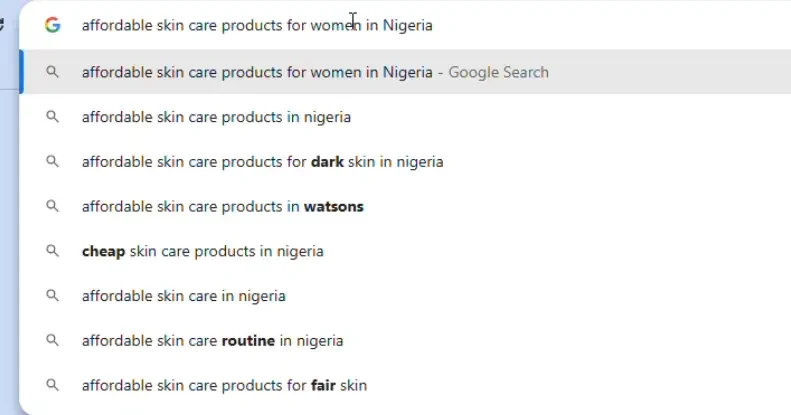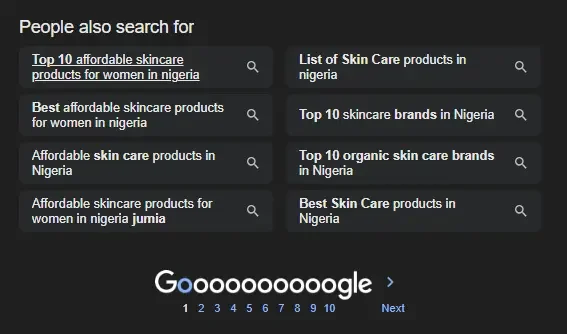SEO Keyword Research for Free for Nigerian Businesses
Tried using Ahrefs, Semrush, or Google Keyword Planner for keyword research and got frustrated when you realized they aren’t completely free? This guide shows you simple ways to do SEO keyword research for free and still get results.
October 17th, 2025.

DataReportal’s “Digital 2025: Nigeria” report indicates that Nigeria’s population was 235 million as of January 2025. Of these, 107 million were internet users, resulting in an internet penetration rate of 45.4%. Nearly half of Nigerians go online daily to find products, services, and information.
Here’s the key: to reach them, your business needs to know what they’re searching for. That’s exactly what keyword research does. Learning to do SEO keyword research for free will help your business show up where customers are searching.
What is Keyword Research?
Keyword research is finding the words and phrases people use in search engines. It helps identify what they are looking for or the information they need.
It is impossible to run a business without offering products or services. And offering products and services is exactly where your keyword research starts. Trust me you don’t want to spend hours and days writing informative content about your products and services and after publishing the content, you see that no one is reading it, then you later discover, the problem is that you have used the wrong keywords to optimize your blog content !!!
Types of Keywords
- Short-tail keywords: These are broad phrases, often called seed keywords. They usually consist of one or two words and are very competitive because they are generic in nature.
Example (Service-based: Digital Marketing Agency)
- “digital marketing”
- “SEO services”
Example (Product-based: Skincare Brand)
- “face cream”
- “body lotion”
Short-tail keywords draw a large audience (globally), so it is tough to rank high for them in search engines.
- Long-tail keywords: These are the opposite of short-tail keywords. They have three or more words. They are more specific and usually face less competition. They help you attract a targeted audience and gain better local visibility.
Example (Service-based: Digital Marketing Agency)
- “affordable SEO services for small businesses in Nigeria”
Example (Product-based: Skincare Brand)
- “Best face cream for oily skin in Lagos.”
- Note: It is advised that you start by using long-tail keywords for your online business. It has a higher chance of ranking your web pages.
Why Keyword Research Is Important for Your Online Business
1. Helps you understand the “Search Intent” of your target audience
What is search intent? Search intent helps us understand the type of answers people expect when they type a query into a search engine. Understanding search intent is one of the biggest benefits of keyword research. It shows what people are thinking when they search: are they looking to buy, compare, or learn more?
Using our previous example, a long-tail keyword.
Type the phrase … “Best face cream for oily skin in Lagos.”
You discover that the top three results are all product pages from e-commerce sites. They showcase their skincare products.
Discovering this, you do not want “Best face cream for oily skin in Lagos” because it will not match search intent.
The kind of modifiers we add before a keyword can help us determine search intent.
2. Checking the competitiveness of the keyword and the keyword’s search volume.
Helps you realize how competitive a keyword is and how easy or hard it is to rank for, check trends, and arrange keywords in terms of priority.
3. Shapes a data-driven content strategy
You create content that aligns with search intent. This analysis reveals what content works best and what to include in your own post or page. Which, in turn forms a foundation for your content strategy.
Types of search intent
Modifiers can help in determining search intent.
Informational search Intent:
- How
- What
- Who
- Where
- Why
- Guide
- Tutorial
- Resource
- Ideas
- Tips
- Learn.
Navigational search Intent:
The searcher already knows where they want to go. They are using Google to get there. Brand names, names of a product, names of a service.
Transactional search Intent:
buy, coupon, order, cheap, price, purchase, etc.
Commercial Search Intent:
Searchers are comparing products or exploring options before deciding to buy. best top review attribute of the product, etc.
How to Do SEO Keyword Research for Free for Nigerian businesses (Step-by-Step)
Here’s a simple way to do keyword research, even if you’re just starting out:
Start with Your Products or Services
Your products and services are your starting point; they form your seed keywords.
For example, if you run a skincare brand, your seed keywords might include:
- Face Cream
- Face Cleanser
- Sunscreen
These are broad, general terms that describe what you sell.
- Face Cream
- Face Cleanser
- Sunscreen
These are broad, general terms that describe what you sell.
Use Google’s free tools.
Auto suggest
Head to Google and start typing your seed keyword (e.g., face cream) in the search bar.
You can also add modifiers if you wish, like affordable face cream, etc.
You’ll notice that Google shows a drop-down list of suggestions as you type. This is called Google Autosuggest. These suggestions are based on real searches people are making — meaning they’re great keyword ideas.
Pro Tip: Type your seed keyword and then add letters from A to Z to discover more keyword variations. For example:
- Face cream a – face cream for acne
Face cream b – best face cream for oily skin
Face cream c – cheap face cream for dry skin.
Mistakes to Avoid When Using Google Autosuggest for Keyword research
- Don’t copy and paste your keyword into the search bar; always type it manually so Google updates the suggestions in real time.
- Don’t stop at one keyword. Try different seed keywords related to your niche to get a wide range of ideas.
After you have gathered all the relevant keywords from Google Autosuggest and put them in a Google Sheet, here is the next step:
Tap search/enter to see the search engine results page (SERP).

People Also Ask
Another free SEO keyword research tool on Google is the “People Also Ask” section.
Scroll down to find the “People Also Ask” section. There, you can click the arrow to see more keywords to add to your sheet. At the bottom of the page, you might also find related searches you can add as well.
- Related Searches
At the bottom of the page, you often see long-tail keywords. These are related to your search and are commonly searched for. You can add them too.


Leveraging your competitors to do SEO keyword research for free
Using Site and colon (site:)
Here, you want to find the keywords your competitors are using that are relevant to your business.
We will still be using Google to implement this, though.
Make sure you have the competitor’s domain name copied already.
A domain name is simply the website’s URL.
All you need to do is type site:competitor’s domain, and then you will see all the content visible on the website. If you want to narrow down, you can add the specific keyword beside the competitor’s domain name. For instance, site:skincarecompetitor.com face cream.
You do this for all your seed keywords, and you have a host of keywords you can work with.
How to use ChatGPT for free SEO keyword research for your business.
You can use ChatGPT as a free and powerful tool for SEO keyword research and blog topics for your business.
Step 1: Use the Right Prompt
Type this prompt into ChatGPT:
“Assume you are a business owner of a [type of business] trying to start a blog to sell [product or service]. Please provide a list of underserved blog topics and keywords in the [your niche] industry that have low competition but high search potential.”
Example:
“Assume you are a business owner of a skincare brand trying to start a blog to sell face creams and serums. Please provide a list of underserved blog topics and keywords in the skincare niche that have low competition but good traffic potential.”
Step 2: Generating more keywords
After you’re satisfied with your keyword list, take each keyword one by one and use this follow-up prompt:
Prompt: “What are the most common questions people ask about this ‘keyword’?”
This helps you uncover real search queries and content ideas that your audience is genuinely interested in.
How to determine if a keyword is good for your business.
1. Check the business potential of the keyword.
Business potential is how relevant and profitable that keyword is for your brand.
The content type shows how searchers prefer their queries answered. This helps you decide if the keyword is worth pursuing.
When you look at Search Engine Result Pages (SERPs), see how the top-ranking pages are set up. They can come in different content types.
Content Type: Blog post, video, product page, category page, or landing page.
If they are all on the blog page, you want to make sure you write a blog if they are all videos.
From YouTube, you want to make sure you create a video.
- Content Format:
- Blog – how-to guides, step-by-step posts, and listicles.
Landing page – tools, calculators, or product showcases.
2. Check the Domain Authority (DA) of websites on the SERP for each keyword.
Domain Authority (DA) is a score from 1 to 100. It shows a site’s strength and credibility. This score depends on factors like backlinks, domain age, and content quality.
If you have a new website, don’t target keywords from sites with a DA between 50 – 98. These sites are often strong and tough to outrank.
Instead, focus on keywords where the top-ranking pages have low to medium DA scores.
Pro Tip: Use the Ubersuggest browser extension. It lets you check the DA of websites right from Google Search results.
Go to Chrome Web Store, search ubbersuggest extension, add it to Chrome, and pin it to window.
3. Check the keyword monthly search volume.
Go to Google and search for “Google Trends.” Once on the site, click “Explore,” then type your keyword into the search bar.
You can filter results by country, time range, or category. This helps you see when and where people search for that keyword the most.
Google Trends doesn’t show exact search numbers. Here’s a simple way to understand visibility:
- A visible graph with data signals a high search volume (around 500+ monthly searches).
- A graph without data points suggests moderate interest. It shows around 200 monthly searches.
- No graph, but data shows that the data points to a typical monthly search volume of about 100.
Tip:
If a keyword shows a steady upward trend or consistent interest over time, it’s a good one to include in your SEO plan.
You can also use the Ashref keyword generator to check keyword search volume.
For a new website, I recommend leveraging competitors’ keywords that relate to your business. Then, check Google Trends for their monthly search volume. This will help you achieve a high rank.

Turn Free Keyword Research into Real Business Growth
Keyword research goes beyond finding words. It’s about knowing your customers and being present where they search. You don’t need expensive tools like Ahrefs or Semrush to make that happen.
Use free tools like Google Autosuggest, People Also Ask, ChatGPT, and Google Trends. They help you find strong keywords that draw the right audience to your business. Use long-tail keywords. Match them with what people are looking for. Create content that directly addresses your customers’ needs.
Open your browser. Try these free SEO keyword research steps. Start optimizing your content today! Your next loyal customer might already be searching; all you need to do is make sure they can find you.
FAQ Keyword Research
Absolutely! You don’t need to pay to find great keywords. There are several free tools and smart strategies you can use to discover what people are searching for online. I actually explained this in detail in my blog post “SEO Keyword Research for Free for Nigerian Businesses”.
Absolutely! You don’t need to pay to find great keywords. There are several free tools and smart strategies you can use to discover what people are searching for online. I actually explained this in detail in my blog post “SEO Keyword Research for Free for Nigerian Businesses”.
Yes, you can! ChatGPT helps you turn broad or seed keywords into more specific ideas. For example, start with “skincare for oily skin” and ask it to suggest keywords like “best cleanser for oily skin.” Just make sure to feed it with your audience type and business goals so the results match what you want to rank for.
Yes! You can do keyword research 100% free using tools like ChatGPT, Keyword Surfer, Google Autocomplete, People Also Ask, and Google Sheets to organize your results. These are all beginner-friendly and explained step-by-step in my full guide “SEO Keyword Research for Free for Nigerian Businesses.
